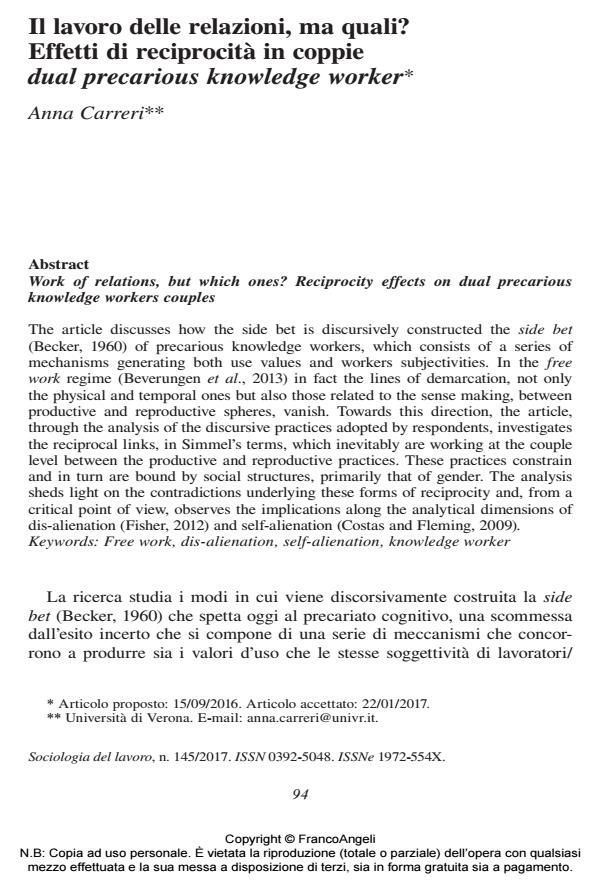Il lavoro delle relazioni, ma quali? Effetti di reciprocità in coppie dual precarious knowledge worker
Titolo Rivista SOCIOLOGIA DEL LAVORO
Autori/Curatori Anna Carreri
Anno di pubblicazione 2017 Fascicolo 2017/145
Lingua Italiano Numero pagine 18 P. 94-111 Dimensione file 133 KB
DOI 10.3280/SL2017-145006
Il DOI è il codice a barre della proprietà intellettuale: per saperne di più
clicca qui
Qui sotto puoi vedere in anteprima la prima pagina di questo articolo.
Se questo articolo ti interessa, lo puoi acquistare (e scaricare in formato pdf) seguendo le facili indicazioni per acquistare il download credit. Acquista Download Credits per scaricare questo Articolo in formato PDF

FrancoAngeli è membro della Publishers International Linking Association, Inc (PILA)associazione indipendente e non profit per facilitare (attraverso i servizi tecnologici implementati da CrossRef.org) l’accesso degli studiosi ai contenuti digitali nelle pubblicazioni professionali e scientifiche
The article discusses how the side bet is discursively constructed the side bet (Becker, 1960) of precarious knowledge workers, which consists of a series of mechanisms generating both use values and workers subjectivities. In the free work regime (Beverungen et al., 2013) in fact the lines of demarcation, not only the physical and temporal ones but also those related to the sense making, between productive and reproductive spheres, vanish. Towards this direction, the article, through the analysis of the discursive practices adopted by respondents, investigates the reciprocal links, in Simmel’s terms, which inevitably are working at the couple level between the productive and reproductive practices. These practices constrain and in turn are bound by social structures, primarily that of gender. The analysis sheds light on the contradictions underlying these forms of reciprocity and, from a critical point of view, observes the implications along the analytical dimensions of dis-alienation (Fisher, 2012) and self-alienation (Costas and Fleming, 2009).
Parole chiave:Free work, dis-alienazione, auto-alienazione, knowledge worker
- Fare marcia indietro. Barriere e risorse nella costruzione dei percorsi lavorativi desiderati dalle donne Anna Carreri, in SOCIOLOGIA DEL LAVORO 148/2017 pp.75
DOI: 10.3280/SL2017-148005
Anna Carreri, Il lavoro delle relazioni, ma quali? Effetti di reciprocità in coppie dual precarious knowledge worker in "SOCIOLOGIA DEL LAVORO " 145/2017, pp 94-111, DOI: 10.3280/SL2017-145006